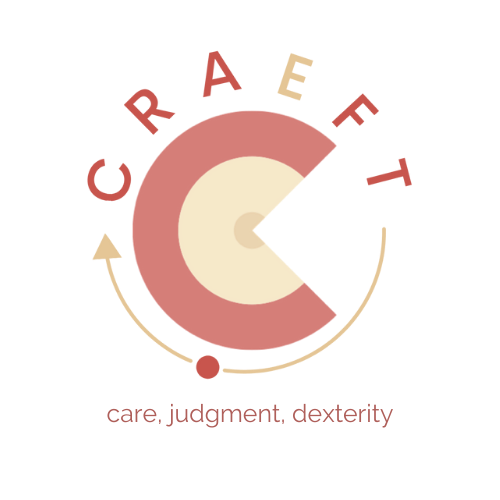Introduction to the Valorisation Pilot
This pilot highlights the key role of digital technologies in enhancing the value and marketability of craft objects, emphasising strategies that enable craft practitioners to reach broader audiences while maintaining the authenticity and uniqueness of their work. The concept of valorisation, as employed in Craeft, refers not only to economic benefits but also to the cultural enrichment of craft practices through innovative dissemination methods. Methodologies such as immersive cultural experiences, interactive craft-based games, and AI-generated craft product narratives, ensure that craft knowledge is preserved and actively circulated within contemporary cultural and economic frameworks.
To achieve this, Pilot 3 explores how Representative Craft Instances (RCIs) – selected craft domains representing various materials and techniques – can be contextualised and communicated through interactive and educational experiences. Craeft introduces a forward-thinking model for craft promotion based on designing craft-based workshops, developing digital marketing tools, and implementing AI-powered storytelling tools. The pilot draws on interdisciplinary research and collaborative input from cultural heritage institutions, academic partners, and craft professionals, ensuring that the proposed solutions are both technologically robust and culturally sensitive.
Pilot components
Introductory crafting experiences for cultural tourism and distance learning
Engaging RCI experiences that aim to create immersive, educational encounters that introduce craft-making processes to in-person and remote audiences. Digital learning tools, interactive demonstrations, and hands-on engagement are integrated so that these experiences cater to cultural tourists, craft enthusiasts, educators, and students.
Sneak peek into the Virtual Furniture Museum of Yecla
Craft-Specific Games and Toys
As a means of engaging a broader audience, Craeft develops interactive and playful craft-based experiences, such as DIY sculpting workshops, chess sets crafted using traditional techniques, and a crafts board game. These initiatives serve as both entertainment and craft education tools.
- Papier mâché sculpting workshop
At Komotini’s Special Kindergarten, Greece, a papier mâché workshop was conducted to observe the benefits of crafts when applied in special education. Children with different impairments worked with teachers, therapists, and Craeft’s partners to create variations of papier mâché into colourful objects. The process aimed to encourage sensory exploration, peer cooperation, and the gradual building of motor coordination.
Materials included recycled paper (old books, mail, catalogues, magazines), a food blender, a basin, a strainer, single-use gloves, and a white book-binding glue. The paper was cut into small pieces, soaked in warm water overnight, and blended into pulp. The pulp was strained to remove water, glue was mixed in for texture, and the final sculpture made by hand could have been coloured before or after drying.
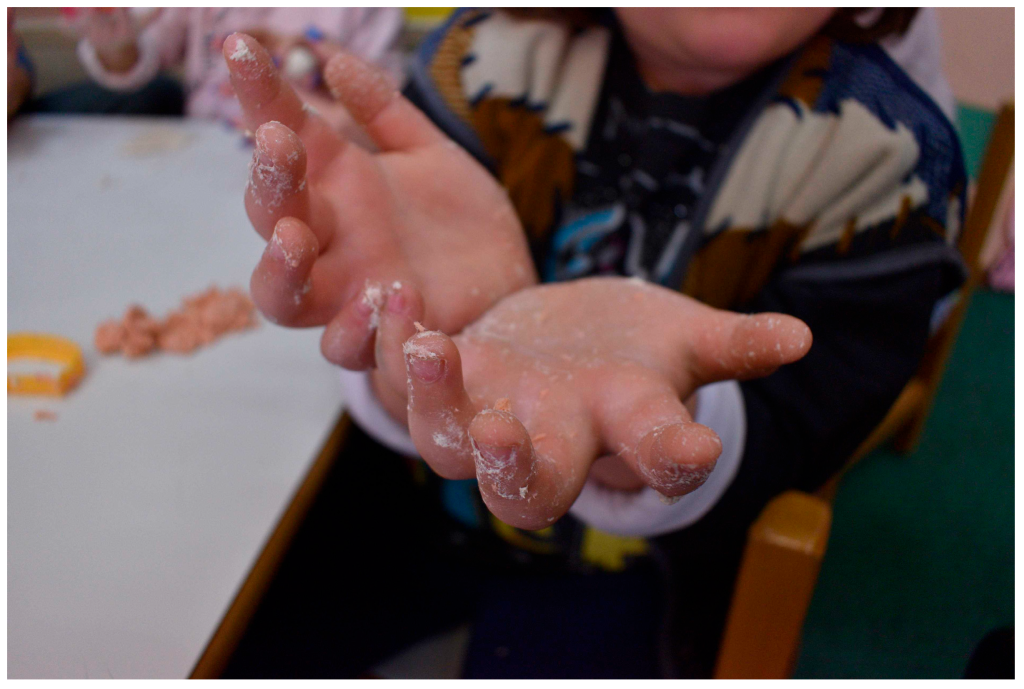
Credit: Danae Kaplanidi, PIOP (2025). Child showing her hands after sculpting papier mâché.
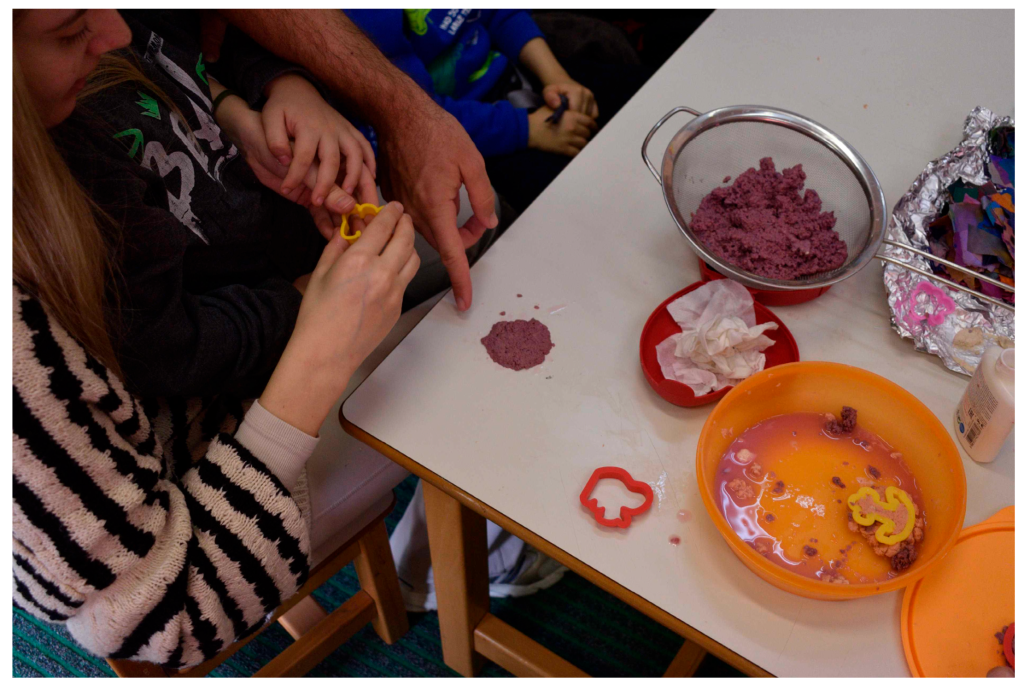
Credit: Danae Kaplanidi, PIOP (2025). Professionals and children during the workshop.
- The Chess project
Under development, more information will be available soon.
- Crafts Board Game
The ‘Crafts’ Board Game, developed by Ioannis Stivaktakis under the supervision of Xenophon Zabulis at the University of Crete, Greece, is an educational board game centered around traditional crafting arts. The idea was initiated by the student’s passion for role-playing board games and the needs of Craeft’s Valorisation pilot. ‘Crafts’ incorporates elements such as resource management, dice-based crafting checks, and a central ‘Market’ system. Players take on the role of artisans, using material cards, dice rolls, and tool upgrades to create intricate objects from raw materials like Sand, Kaolin, Clay, Wood, and Marble. The game aims to balance strategic depth with accessibility and is freely available on GitHub and Steam’s Tabletop Simulator, encouraging contributions and widespread play.
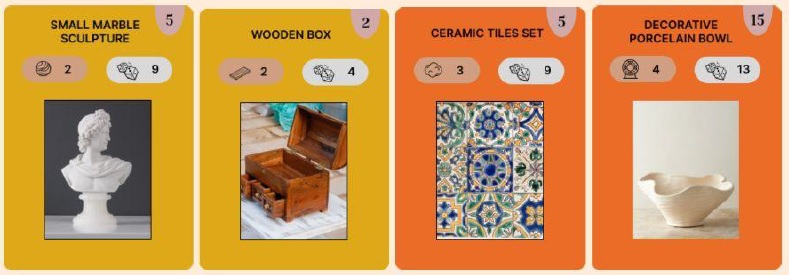
Credit: Ioannis Stivaktakis. Seller Cards: Represent orders from the seller, showing the requirements for each crafted item.
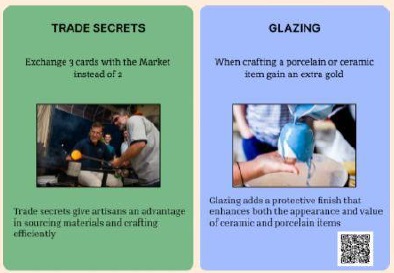
Credit: Ioannis Stivaktakis. Upgrade Cards: Enhancements that represent advanced techniques or expertise.
- RCI Digital Contextualisation
Building theoretically on material culture studies’ concept of biographical objects, economics’ servitisation and circular economy principles, and technologically from Mingei’s object recognition technology and Product Biography Information Systems, this work introduces a digital framework for craft product biographies. Through an online content collection form, users can generate structured narratives—ranging from third-person historical descriptions to AI-generated first-person object biographies and sound narratives. This system enhances product storytelling, connects consumers with craft heritage, and supports craft professionals in sustainable marketing.
